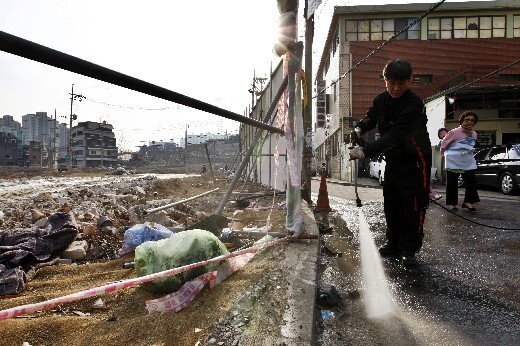hankyoreh
Links to other country sites 다른 나라 사이트 링크
Yongsan tragedy sheds light on small business owners facing big losses from redevelopment projects

Faced with the prospect of losing their livelihoods, many self-employed small business owners who rented space in the Yongsan redevelopment zone were moved to join a demonstration against a neighborhood redevelopment project that resulted in the deaths of six people last week. Resistance to the redevelopment plan is largely due to the nation’s redevelopment compensation policy, which forces many small business owners in redevelopment zones to not only give up their shops but also forfeit the sizable premiums they paid when they rented the commercial retail space. In return, they receive compensation that is less than adequate and often puts them out of business altogether.
Under the current compensation rules, people who rent retail space in commercial buildings that are in the path of redevelopment become eligible for compensation after going though an appraisal process to determine the business’ monthly revenue. They are then given compensation in an amount equal to three months of their income. If they accept, the money is paid and the company overseeing the redevelopment project is given a green light to begin demolishing the buildings in the redevelopment zone.
However, the standards used to determine the amount of compensation paid are generally not large enough to compensate them for their initial investment, which includes the premiums they paid when they rented the commercial retail space and other start-up costs. Though the amount of the premium, a one-time fee, depends on the size and location of the building, it can range from tens to hundreds of millions of won.
Lee Ho, head of the Grassroots Research Institute, said that the areas slated for redevelopment are often those supporting small business owners paying low rent for their facilities, meaning that low-income self-employed people are the ones being forced out of business. He also said that in a situation in which redevelopment projects put these people in a position where they could lose their only means of living, providing compensation in an amount equal to three months of their income is not enough.
Some observers have suggested that a public organization is needed to resolve these issues fairly. The number of self-employed people surged in the wake of the 1997-98 Asian financial crisis, but the lack of an adequate social safety net spells trouble for many people faced with the prospect of having to move their businesses in order to comply with redevelopment plans.
Kim Young-il, an executive researcher at the New Society Open Research Institute (Saesayeon), said, “There is a need for redevelopment plans that place a higher fiscal burden on the government or a redevelopment process that minimizes the loss of the premiums by increasing the amount of money paid as compensation. If commercial building tenants, who are mostly in their mid-40s or older, are forced to leave, it won’t be easy for them to find other jobs,” Kim said. “That is similar to the situation that farmers in urban areas face.”
Please direct questions or comments to [englishhani@hani.co.kr]
Editorial・opinion
![[Editorial] Penalties for airing allegations against Korea’s first lady endanger free press [Editorial] Penalties for airing allegations against Korea’s first lady endanger free press](https://flexible.img.hani.co.kr/flexible/normal/500/300/imgdb/original/2024/0502/1817146398095106.jpg) [Editorial] Penalties for airing allegations against Korea’s first lady endanger free press
[Editorial] Penalties for airing allegations against Korea’s first lady endanger free press![[Editorial] Yoon must halt procurement of SM-3 interceptor missiles [Editorial] Yoon must halt procurement of SM-3 interceptor missiles](https://flexible.img.hani.co.kr/flexible/normal/500/300/imgdb/child/2024/0501/17145495551605_1717145495195344.jpg) [Editorial] Yoon must halt procurement of SM-3 interceptor missiles
[Editorial] Yoon must halt procurement of SM-3 interceptor missiles- [Guest essay] Maybe Korea’s rapid population decline is an opportunity, not a crisis
- [Column] Can Yoon steer diplomacy with Russia, China back on track?
- [Column] Season 2 of special prosecutor probe may be coming to Korea soon
- [Column] Park Geun-hye déjà vu in Yoon Suk-yeol
- [Editorial] New weight of N. Korea’s nuclear threats makes dialogue all the more urgent
- [Guest essay] The real reason Korea’s new right wants to dub Rhee a founding father
- [Column] ‘Choson’: Is it time we start referring to N. Korea in its own terms?
- [Editorial] Japan’s rewriting of history with Korea has gone too far
Most viewed articles
- 11 in 3 S. Korean security experts support nuclear armament, CSIS finds
- 2Months and months of overdue wages are pushing migrant workers in Korea into debt
- 3Bills for Itaewon crush inquiry, special counsel probe into Marine’s death pass National Assembly
- 4[Reporter’s notebook] In Min’s world, she’s the artist — and NewJeans is her art
- 5[Editorial] Penalties for airing allegations against Korea’s first lady endanger free press
- 6S. Korean Defense Ministry rejects petition from Vietnam War civilian massacre survivors
- 7[Column] Can Yoon steer diplomacy with Russia, China back on track?
- 8[Reportage] A petition of tears by victims of civilian massacres during Vietnam War
- 9Civic groups demand S. Korean government take responsibility for Vietnam War civilian massacres
- 10Another court rules NIS to release data on Vietnam War civilian massacres